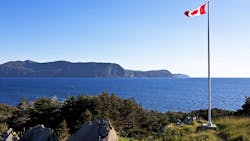Canada assesses Jeanne d’Arc basin natural gas resources
Editor's Note: Updated June 10, 2025, to correct the mention of the governing body that released the assessment. The estimate was released by Newfoundland and Labrador Minister, Industry, Energy and Technology, not the Canadian Minister as previously written.
- The Honourable Steve Crocker, Minister of Industry, Energy and Technology, released the Provincial Government’s Natural Gas Resource Assessment which demonstrates the natural gas potential for the province in Jeanne d’Arc basin.
The Government of Newfoundland and Labrador assessed natural gas resources for the province in Jeanne d’Arc basin, the first comprehensive analysis of the province’s gas potential in the basin, utilizing current subsurface geological data and methodologies.
The assessment determined an 8.1-11.3 tcf resource base with a 9.7 tcf best estimate. For comparison, Nova Scotia’s Sable Offshore Energy Project estimated 3 tcf of recoverable gas at the development stage and produced 2 tcf over a 20-year period.
Budget 2023 included $4.7 million to conduct the assessment to define further and understand the range of estimated recoverable gas within the basin.
Work began in the fall of 2023, focusing on evaluating 18 areas within the basin offshore Newfoundland and Labrador where there are proven discoveries within the significant discovery licenses (SDLs) or production licenses (PLs) in currently producing Hibernia, Hebron, White Rose, North Amethyst, and Terra Nova fields.
This basin was the initial focus given the shallow waters, the existing producing infrastructure, and the supply and service community available to service any developments.
While completing the assessment, additional proven natural gas resources adjacent to or residing on the SDLs and PLs were identified. A projection of 20 identified prospects to be evaluated indicated potential for a further 7.4-30.6 tcf of natural gas. Budget 2025 includes almost $1 million for the second phase of the natural gas resource assessment to evaluate the additional prospects identified.
About the Author
Alex Procyk
Upstream Editor
Alex Procyk is Upstream Editor at Oil & Gas Journal. He has also served as a principal technical professional at Halliburton and as a completion engineer at ConocoPhillips. He holds a BS in chemistry (1987) from Kent State University and a PhD in chemistry (1992) from Carnegie Mellon University. He is a member of the Society of Petroleum Engineers (SPE).

